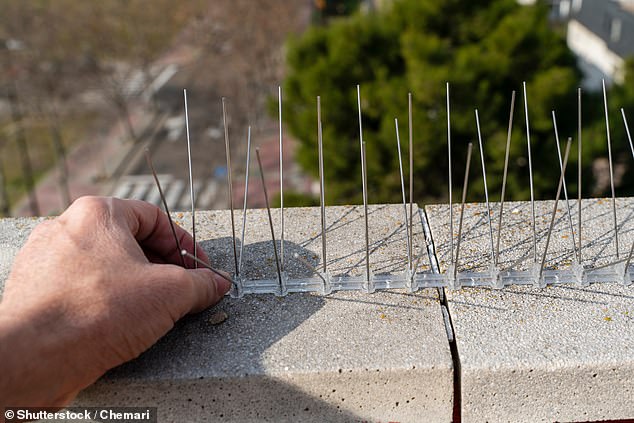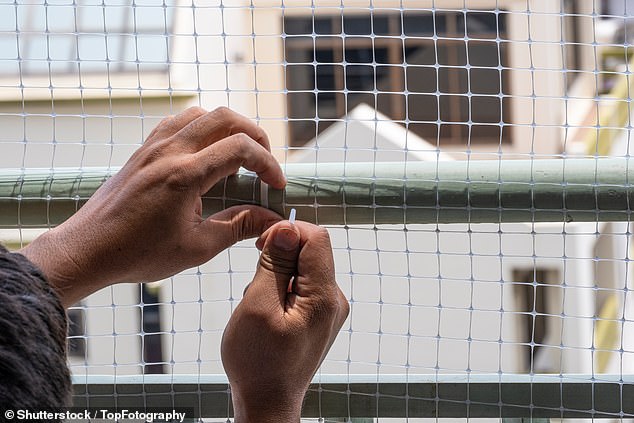My new home has a pigeon plague: how do I get rid of it?
We just moved into our first property: a brand new apartment. When we moved there, we were shocked to discover that there was a serious pigeon problem.
Pigeons have been breeding for months and the entire balcony was covered in bird droppings.
We have been living in the property for a few months now and have asked the owner – the same company that sold us the property – to resolve the problem.
However, the management team has not yet been able to address the problem. The pigeons keep coming, no matter how scared we make them.
They keep pooping everywhere, which means our efforts to clean are in vain. But perhaps worst of all: they make so much noise.
It’s a mess: the brand new balcony of our reader’s apartment is full of pigeon droppings
What is the best way to deal with this problem? A friend suggested putting up nets as it is an enclosed balcony.
But we’ve seen examples of people doing this in the past and it just looks terrible.
Do you have any advice on how we should sort it? What will be the likely costs? And should it actually be our responsibility to sort? Shouldn’t that be the property owner and the management company?
Ed Magnus from This is Money answers: Congratulations on the purchase of your first home.
If it’s any consolation, it’s rare for someone to move into a new home without something wrong – whether it’s a new construction or something built more than a century ago.
That said, a pigeon problem is an annoying one, considering the mess and noise they create.
Since you’ve just moved, you’re right to wonder whether resolving the issue is your own owner’s responsibility, even though that depends on the terms of your lease.
Most new build homes also come with a ten year structural warranty, of which the developer is typically required to cover the first two years to fix any issues in the property.
In most cases this would include something like a leaking pipe, but it should probably also include a pest problem, especially if it was one that was present when you moved into the property.
In terms of techniques for getting rid of pigeons – there are many.
As you mentioned, installing bird netting can be an option, but it is quite unsightly.
There are also anti-bird spikes, which aim to prevent pigeons from nesting or perching along the balcony.
There are also sticky bird gels that serve essentially the same purpose.
Pigeons are also afraid of the sight of dominant birds.
For example, using a fake owl that lights up or makes realistic sounds can also be a way to wrap them up. These can be purchased online.
For expert advice on how best to deal with pigeons and also on the question of who is legally responsible, we spoke Niall Gallaghertechnical and compliance manager at the British Pest Control Association and also Lisa Gibbs And Samantha Holdenboth residential real estate partners at HCR Law.

Prepare the defenses: Anti-bird spikes are intended to prevent pigeons from nesting or perching along the balcony
How do they get rid of the pigeons?
Niall Gallagher replies: What a nightmare. When feral pigeons enter our space, they pose a public health problem because they can spread disease and cause other problems. So you are right to want this to be resolved as quickly as possible.
The first thing we need to be very clear about is that all British birds, their eggs and nests are protected under the Wildlife and Countryside Act.
This means that any action must be carried out by a competent professional with knowledge of this law and the permits involved in bird management.
There are many ways to prevent birds from nesting on your property, and pest professionals will use things like barriers, spikes, netting and wire to great effect.
Other options such as shock strips, audible deterrents and optical gels have been used to create negative associations in birds seeking to land or roost on buildings.
All of these methods of control have their benefits, and some can provide a stronger and more lasting deterrent, but as with any control method, they can become less effective over a longer period of time.

Bird net: Perhaps the most effective solution is a bird net, but this is quite ugly
Can they just install the deterrents?
Niall Gallagher replies: It is important to note that bird control is a complex task that should always be left to trained pest professionals, and not as a do-it-yourself project.
There are several important reasons why professional expertise is essential, including safety, effectiveness and compliance with animal welfare laws.
It is difficult to estimate how much this could cost. A quote for the work will be provided during the survey, but costs will depend on factors such as access, materials and size of installation, as well as differences between companies.

Niall Gallagher, Technical and Compliance Manager at the British Pest Control Association
Is the owner responsible for solving the problem?
Lisa Gibbs replies: First you need to review the terms of your rental agreement, which sets out the obligations for the landlord, the management company and for you, the tenant.
Generally, the landlord or management company is responsible for the maintenance of the building.
You should check the definitions in the lease to see if the balcony is part of the structure of the building – and is likely the landlord’s responsibility – or if it is part of the estate, which could mean it is your responsibility.
If the rental contract states that the landlord or management company is responsible for the balcony, you can contact them to resolve the problem.
A formal letter to the landlord with photographs of the mess, indicating that the droppings are not only unsightly, but can also have serious consequences for human health and lead to structural deterioration of the balcony, should encourage the landlord to take action to undertake.

Lisa Gibbs, joint head of residential real estate and partner at HCR Law
The letter may also indicate that if no action is taken within a reasonable time, you may have to take formal legal action for breach of the landlord’s obligations.
Any legal action will likely be slow and costly, so it may be worth contacting a local pest control company to help in the short term. Keep a record of all your expenses for any legal claims.
Samantha Houlden adds: You may be tempted to withhold service charges or ground rent until the matter is resolved, but it is likely that the lease will prohibit this and you could end up being saddled with late payment penalties or action for non-payment.
In addition, most rental agreements contain a covenant stating that the tenant is entitled to the quiet enjoyment of his or her property.

Samantha Houlden, partner and co-head of residential real estate at HCR Law
The sound of the doves could be a disruption of this covenant and this is something else that could be explored.
Niall Gallagher adds: As for who is responsible for solving the problem and paying for a pest professional, it depends on what is in the contracts you may have signed.
Typically, however, the owner is responsible for the repair and maintenance of the exterior and common areas of the building. Therefore, it is believed that he or she is responsible for solving this problem if the problem lies there.
If the birds nested in the property because a window was open, you can safely assume that you are responsible.
Do you have a problem with a property? Contact: editor@thisismoney.co.uk
Some links in this article may be affiliate links. If you click on it, we may earn a small commission. That helps us fund This Is Money and keep it free to use. We do not write articles to promote products. We do not allow a commercial relationship to compromise our editorial independence.
